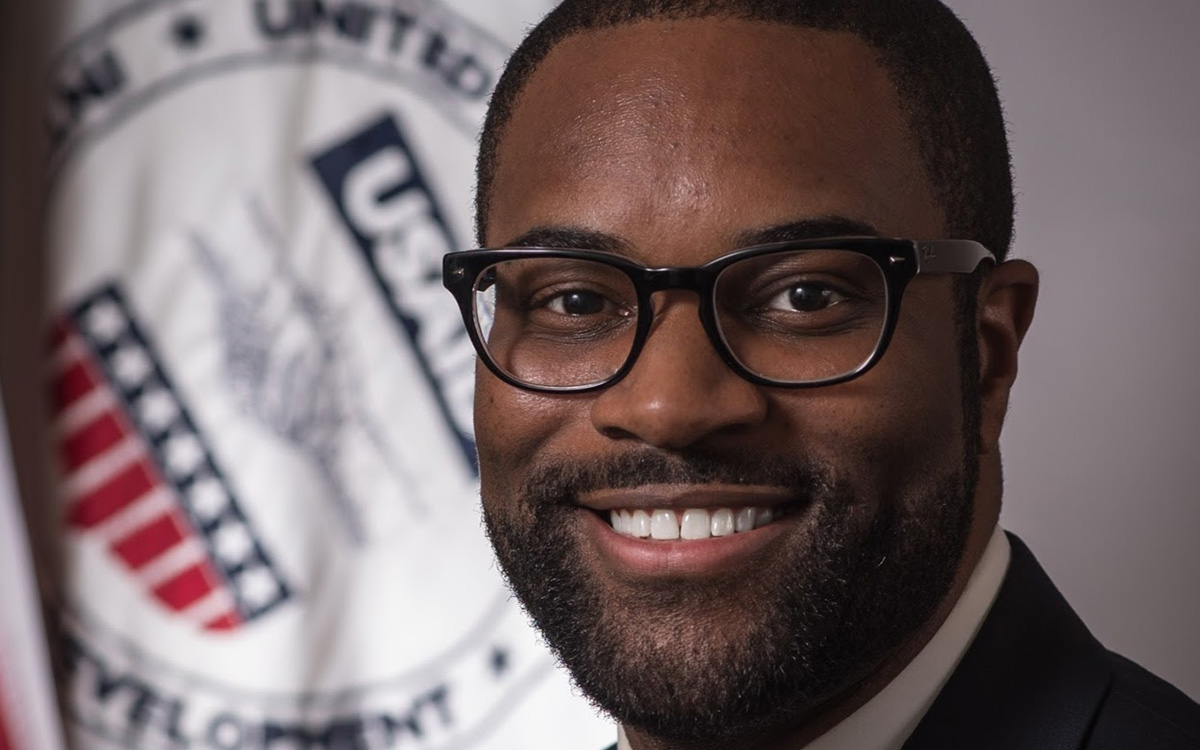Federal Government
EXCLUSIVE: USAID LGBTQ coordinator visits Uganda
Jay Gilliam met with activists, community members from Feb. 19-27

U.S. Agency for International Development Senior LGBTQI+ Coordinator Jay Gilliam last month traveled to Uganda.
Gilliam was in the country from Feb. 19-27. He visited Kampala, the Ugandan capital, and the nearby city of Jinja.
Gilliam met with LGBTQ activists who discussed the impact of the Anti-Homosexuality Act, a law with a death penalty provision for “aggravated homosexuality” that President Yoweri Museveni signed last May. Gilliam also sat down with USAID staffers.
Gilliam on Wednesday during an exclusive interview with the Washington Blade did not identify the specific activists and organizations with whom he met “out of protection.”
“I really wanted to meet with community members and understand the impacts on them,” he said.
Consensual same-sex sexual relations in Uganda were already criminalized before Museveni signed the Anti-Homosexuality Act. Gilliam told the Blade he spoke with a person who said authorities arrested them at a community meeting for mental health and psychosocial support “under false pretenses of engaging in same-sex relations and caught in a video that purportedly showed him.”
The person, according to Gilliam, said authorities outed them and drove them around the town in which they were arrested in order to humiliate them. Gilliam told the Blade that prisoners and guards beat them, subjected them to so-called anal exams and denied them access to antiretroviral drugs.
“They were told that you are not even a human being. From here on you are no longer living, just dead,” recalled Gilliam.
“I just can’t imagine how difficult it is for someone to be able to live through something like that and being released and having ongoing needs for personal security, having to be relocated and getting support for that and lots of other personal issues and trauma,” added Gilliam.
Gilliam said activists shared stories of landlords and hotel owners evicting LGBTQ people and advocacy groups from their properties. Gilliam told the Blade they “purport that they don’t want to run afoul of” the Anti-Homosexuality Act.
“These evictions really exacerbate the needs from the community in terms of relocation and temporary shelter and just the trauma of being kicked out of your home, being kicked out of your village and having to find a place to stay at a moment’s notice, knowing that you’re also trying to escape harm and harassment from neighbors and community members,” he said.
Gilliam also noted the Anti-Homosexuality Act has impacted community members in different ways.
Reported cases of violence and eviction, for example, are higher among gay men and transgender women. Gilliam noted lesbian, bisexual and queer women and trans men face intimate partner violence, are forced into marriages, endure corrective rape and lose custody of their children when they are outed. He said these community members are also unable to inherit land, cannot control their own finances and face employment discrimination because of their sexual orientation or gender identity.
US sanctioned Ugandan officials over Anti-Homosexuality Act
The U.S imposed visa restrictions on Ugandan officials shortly after Museveni signed the law. The World Bank Group later announced the suspension of new loans to Uganda.
The Biden-Harris administration last October issued a business advisory that said the Anti-Homosexuality Act “further increases restrictions on human rights, to include restrictions on freedoms of expression and peaceful assembly and exacerbates issues regarding the respect for leases and employment contracts.” The White House has also removed Uganda from a program that allows sub-Saharan African countries to trade duty-free with the U.S. and has issued a business advisory for the country over the Anti-Homosexuality Act.
Secretary of State Antony Blinken on Dec. 4, 2023, announced sanctions against current and former Ugandan officials who committed human rights abuses against LGBTQ people and other groups. Media reports this week indicate the U.S. denied MP Sarah Achieng Opendi a visa that would have allowed her to travel to New York in order to attend the annual U.N. Commission on the Status of Women.
Museveni, for his part, has criticized the U.S. and other Western countries’ response to the Anti-Homosexuality Act.
Gilliam noted authorities have arrested and charged Ugandans under the law.
Two men on motorcycles on Jan. 3 stabbed Steven Kabuye, co-executive director of Coloured Voice Truth to LGBTQ Uganda, outside his home while he was going to work. The incident took place months after Museveni attended Uganda’s National Prayer Breakfast at which U.S. Rep. Tim Walberg (R-Mich.) spoke and defended the Anti-Homosexuality Act.
The State Department condemned the attack that Kabuye blamed on politicians and religious leaders who are stoking anti-LGBTQ sentiments in Uganda. Gilliam did not meet with Ugandan government officials while he was in the country.
“We in the U.S. government have already made it clear our stance with government officials on how we feel about the AHA, as well as broader human rights concerns in country,” said Gilliam. “That’s been communicated from the very highest levels.”
The Uganda’s Constitutional Court last Dec. 18 heard arguments in a lawsuit that challenges the Anti-Homosexuality Act. It is unclear when a ruling in the case will take place, but Gilliam said LGBTQ Ugandans with whom he met described the law “as just one moment.”
“Obviously there is lots of work that has been done, that continues to be done to respond to this moment,” he told the Blade. “They know that there’s going to be a lot of work that needs to continue to really address a lot of the root causes and to really back humanity to the community.”
Gilliam further noted it will “take some years to recover from the damage of 2023 and the AHA (Anti-Homosexuality Act) there.” He added activists are “already laying down the groundwork for what that work looks like” in terms of finding MPs, religious leaders, human rights activists and family members who may become allies.
“Those types of allyships are going to be key to building back the community and to continue the resiliency of the movement,” said Gilliam.
Federal Government
Holiday week brings setbacks for Trump-Vance trans agenda
Federal courts begin to deliver end-of-year responses to lawsuits involving federal transgender healthcare policy.

While many Americans took the week of Christmas to rest and relax, LGBTQ politics in the U.S. continued to shift. This week’s short recap of federal updates highlights two major blows to the Trump-Vance administration’s efforts to restrict gender-affirming care for minors.
19 states sue RFK Jr. to end gender-affirming care ban
New York Attorney General Letitia James announced on Tuesday that the NYAG’s office, along with 18 other states (and the District of Columbia), filed a lawsuit to stop U.S. Health and Human Services (HHS) Secretary Robert F. Kennedy Jr. from restricting gender-affirming care for minors.
In the press release, Attorney General James stressed that the push by the Trump-Vance administration’s crusade against the transgender community — specifically transgender youth — is a “clear overreach by the federal government” and relies on conservative and medically unvalidated practices to “punish providers who adhere to well-established, evidence-based care” that support gender-affirming care.
“At the core of this so-called declaration are real people: young people who need care, parents trying to support their children, and doctors who are simply following the best medical evidence available,” said Attorney General James. “Secretary Kennedy cannot unilaterally change medical standards by posting a document online, and no one should lose access to medically necessary health care because their federal government tried to interfere in decisions that belong in doctors’ offices. My office will always stand up for New Yorkers’ health, dignity, and right to make medical decisions free from intimidation.”
The lawsuit is a direct response to HHS’ Dec. 18 announcement that it will pursue regulatory changes that would make gender-affirming health care for transgender children more difficult, if not impossible, to access. It would also restrict federal funding for any hospital that does not comply with the directive. KFF, an independent source for health policy research, polling, and journalism, found that in 2023 federal funding covered nearly 45% of total spending on hospital care in the U.S.
The HHS directive stems directly from President Donald Trump’s Jan. 28 Executive Order, Protecting Children From Chemical and Surgical Mutilation, which formally establishes U.S. opposition to gender-affirming care and pledges to end federal funding for such treatments.
The American Medical Association, the nation’s largest and most influential physician organization, has repeatedly opposed measures like the one pushed by President Trump’s administration that restrict access to trans health care.
“The AMA supports public and private health insurance coverage for treatment of gender dysphoria and opposes the denial of health insurance based on sexual orientation or gender identity,” a statement on the AMA’s website reads. “Improving access to gender-affirming care is an important means of improving health outcomes for the transgender population.”
The lawsuit also names Oregon, Washington, California, Colorado, Connecticut, Delaware, the District of Columbia, Illinois, Maine, Maryland, Massachusetts, Michigan, Minnesota, New Mexico, Pennsylvania, Rhode Island, Vermont, and Wisconsin as having joined New York in the push against restricting gender-affirming care.
At the HHS news conference last Thursday, Jim O’Neill, deputy secretary of the department, asserted, “Men are men. Men can never become women. Women are women. Women can never become men.”
DOJ stopped from gaining health care records of trans youth
U.S. District Judge Cathy Bissoon blocked an attempt by the Department of Justice (DOJ) to gain “personally identifiable information about those minor transgender patients” from the University of Pittsburgh Medical Center (UPMC), saying the DOJ’s efforts “fly in the face of the Supreme Court.”
Journalist Chris Geidner originally reported the news on Dec. 25, highlighting that the Western District of Pennsylvania judge’s decision is a major blow to the Trump-Vance administration’s agenda to curtail transgender rights.
“[T]his Court joins the others in finding that the government’s demand for deeply private and personal patient information carries more than a whiff of ill intent,” Bissoon wrote in her ruling. “This is apparent from its rhetoric.”
Bissoon cited the DOJ’s “incendiary characterization” of trans youth care on the DOJ website as proof, which calls the practice politically motivated rather than medically sound and seeks to “…mutilate children in the service of a warped ideology.” This is despite the fact that a majority of gender-affirming care has nothing to do with surgery.
In United States v. Skrmetti, the Supreme Court ruled along party lines that states — namely Tennessee — have the right to pass legislation that can prohibit certain medical treatments for transgender minors, saying the law is not subject to heightened scrutiny under the Equal Protection Clause of the Fourteenth Amendment because it does not involve suspect categories like race, national origin, alienage, and religion, which would require the government to show the law serves a compelling interest and is narrowly tailored, sending decision-making power back to the states.
“The government cannot pick and choose the aspects of Skrmetti to honor, and which to ignore,” Judge Bissoon added.
The government argued unsuccessfully that the parents of the children whose records would have been made available to the DOJ “lacked standing” because the subpoena was directed at UPMC and that they did not respond in a timely manner. Bissoon rejected the timeliness argument in particular as “disingenuous.”
Bissoon, who was nominated to the bench by then-President Obama, is at least the fourth judge to reject the DOJ’s attempted intrusion into the health care of trans youth according to Geidner.
Federal Government
HHS ‘peer-reviewed’ report calls gender-affirming care for trans youth dangerous
Advocates denounce document as ‘sham science’

The U.S. Department of Health and Human Services on Nov. 19 released what it called an updated “peer reviewed” version of an earlier report claiming scientific evidence shows that gender-affirming care or treatment for juveniles that attempts to change their gender is harmful and presents a danger to “vulnerable children.”
“The report, released through the Office of the Assistant Secretary of Health, finds that the harms from sex-rejecting procedures — including puberty blockers, cross-sex hormones, and surgical operations — are significant, long term, and too often ignored or inadequately tracked,” according to a statement released by HHS announcing the release of the report.
“The American Medical Association and the American Academy of Pediatrics peddled the lie that chemical and surgical sex-rejecting procedures could be good for children,” said HHS Secretary Robert F. Kennedy Jr. in the HHS statement, “They betrayed their oath to first do no harm, and their so-called ‘gender affirming care’ has inflicted lasting physical and psychological damage on vulnerable young people,” Kennedy says in the statement.
The national LGBTQ advocacy organizations Human Rights Campaign and GLAAD issued statements on the same day the HHS report was released, denouncing it as a sham based on fake science and politics.
HRC called the report “a politically motivated document filled with outright lies and misinformation.”
In its own statement released on the same day the HHS report was released, HRC said HHS’s so-called peer reviewed report is similar to an earlier HHS report released in May that had a “predetermined outcome dictated by grossly uninformed political actors that have deliberately mischaracterized health care for transgender youth despite the uniform, science backed conclusion of the American medical and mental health experts to the contrary.”
The HRC statement adds, “Trans people’s health care is delivered in age-appropriate, evidence-based ways, and decisions to provide care are made in consultation with doctors and parents, just like health care for all other people.”
In a separate statement, GLAAD CEO Sarah Kate Ellis called the HHS report a form of “discredited junk science.” She added the report makes claims that are “grossly misleading and in direct contrast to the recommendations of every leading health authority in the world … This report amounts to nothing more than forcing the same discredited idea of conversion therapy that ripped families apart and harmed gay, lesbian, and bisexual young people for decades.”
In its statement announcing the release of its report, HHS insists its own experts rather than those cited by its critics are the ones invoking true science.
“Before submitting its report for peer review, HHS commissioned the most comprehensive study to date of the scientific evidence and clinical practices surrounding the treatment of children and adolescents for ‘gender dysphoria,’” the statement continues. “The authors were drawn from disciplines and professional backgrounds spanning medicine, bioethics, psychology, and philosophy.”
In a concluding comment in the HHS statement, Assistant Secretary for Health Brian Christine says, “Our report is an urgent wake-up call to doctors and parents about the clear dangers of trying to turn girls into boys and vice versa.”

President Donald Trump on Wednesday signed a bill that reopens the federal government.
Six Democrats — U.S. Reps. Jared Golden (D-Maine), Marie Gluesenkamp Perez (D-Wash.), Adam Gray (D-Calif.), Don Davis (D-N.C.), Henry Cuellar (D-Texas), and Tom Suozzi (D-N.Y.) — voted for the funding bill that passed in the U.S. House of Representatives. Two Republicans — Thomas Massie (R-Ky.) and Greg Steube (R-Fla.) — opposed it.
The 43-day shutdown is over after eight Democratic senators gave in to Republicans’ push to roll back parts of the Affordable Care Act. According to CNBC, the average ACA recipient could see premiums more than double in 2026, and about one in 10 enrollees could lose a premium tax credit altogether.
These eight senators — U.S. Sens. Catherine Cortez Masto (D-Nev.), Dick Durbin (D-Ill.), John Fetterman (D-Pa.), Maggie Hassan (D-N.H.), Tim Kaine (D-Va.), Angus King (I-Maine), Jacky Rosen (D-Nev.), and Jeanne Shaheen (D-N.H.) — sided with Republicans to pass legislation reopening the government for a set number of days. They emphasized that their primary goal was to reopen the government, with discussions about ACA tax credits to continue afterward.
None of the senators who supported the deal are up for reelection.
King said on Sunday night that the Senate deal represents “a victory” because it gives Democrats “an opportunity” to extend ACA tax credits, now that Senate Republican leaders have agreed to hold a vote on the issue in December. (The House has not made any similar commitment.)
The government’s reopening also brought a win for Democrats’ other priorities: Arizona Congresswoman Adelita Grijalva was sworn in after a record-breaking delay in swearing in, eventually becoming the 218th signer of a discharge petition to release the Epstein files.
This story is being updated as more information becomes available.
-

 U.S. Supreme Court4 days ago
U.S. Supreme Court4 days agoSupreme Court hears arguments in two critical cases on trans sports bans
-

 Opinions5 days ago
Opinions5 days agoTeam Rayceen’s hiatus is officially over
-

 U.S. Military/Pentagon5 days ago
U.S. Military/Pentagon5 days agoHRC holds retirement ceremony for ousted transgender servicemembers
-

 U.S. Supreme Court5 days ago
U.S. Supreme Court5 days agoAs Supreme Court weighs trans sports bans, advocate and former athlete speaks out




















